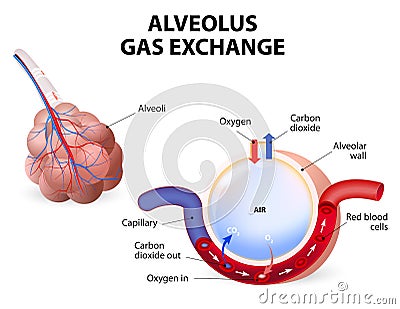The goal of this blog is to bring some fresh air your Friday night dinner table a little higher. Please print and share.
 Here's something cool to stump everyone at your dinner table.
Here's something cool to stump everyone at your dinner table.
If it doesn't impress them, they're surely asleep.
Question: What are the two primary gasses in the air we breathe, and at what ratios.
Answer: Nitrogen (78%) and Oxygen (21%)
Only 21 percent oxygen? That's counter-intuitive.
Does all that nitrogen do anything, or is it there just as a sort of accident of nature
It turns out that it does something very, very important.
Or actually two things that are very, very important.
First, when you inhale, all that air fills your lungs. Specifically, fills little sacks inside your lungs called alveoli. (Here's a detailed illustration.)These mini sacks achieve the truly remarkable feat of absorbing about 1.5 gallons (6 liters) of oxygen per minute, which is 378 gallons per hour, which is over 9,000 gallons per day (and I suppose exchanging the oxygen for equal amounts of CO2).
Now, take a deep breath and hold it for a moment:
Wwhile all that air is in your lungs and the oxygen is going into your blood, you have all this extra gas (nitrogen) just sitting there.
But it ain't just sitting there - it's keep your alveoli inflated!
A long time ago, doctors and nurses learned that if you give a patient pure (100%) oxygen, it will lead to a collapse of the alveoli.
That would be bad.
Even a slight increase in the amount of oxygen - let's say up to 50 percent - is risky and has to be managed carefully.
Also, too much oxygen itself may speed up aging.
But that's not the only amazing thing about the nitrogen in the air.
Let's say that the air had less nitrogen and more oxygen and our bodies somehow were able to adjust in order to handle it.
We'd still have a really big problem.
How do you put out a fire quickly? Get rid of its oxygen. Snuff it out.
Oxygen, you may recall, is the key ingredient to combustion.
If the atmosphere contained more oxygen, things like wood, dry leaves and so on would catch fire a lot quicker. One little spark and ... watch out!
(It is also possible that insects would grow much larger. And it may have happened before.)
So we could probably survive, but Spaceship Earth would be a treacherous place to live.
That's something amazing I learned this week. How about you?
Shabbat Shalom
PS - Clock's still ticking... do you know how many days til Hannuka?
Like this email? How about voting with your finger: Like it, tweet it, or just forward it.
 Here's something cool to stump everyone at your dinner table.
Here's something cool to stump everyone at your dinner table.If it doesn't impress them, they're surely asleep.
Question: What are the two primary gasses in the air we breathe, and at what ratios.
Answer: Nitrogen (78%) and Oxygen (21%)
Only 21 percent oxygen? That's counter-intuitive.
Does all that nitrogen do anything, or is it there just as a sort of accident of nature
It turns out that it does something very, very important.
Or actually two things that are very, very important.
First, when you inhale, all that air fills your lungs. Specifically, fills little sacks inside your lungs called alveoli. (Here's a detailed illustration.)These mini sacks achieve the truly remarkable feat of absorbing about 1.5 gallons (6 liters) of oxygen per minute, which is 378 gallons per hour, which is over 9,000 gallons per day (and I suppose exchanging the oxygen for equal amounts of CO2).
Now, take a deep breath and hold it for a moment:
Wwhile all that air is in your lungs and the oxygen is going into your blood, you have all this extra gas (nitrogen) just sitting there.
But it ain't just sitting there - it's keep your alveoli inflated!
A long time ago, doctors and nurses learned that if you give a patient pure (100%) oxygen, it will lead to a collapse of the alveoli.
That would be bad.
Even a slight increase in the amount of oxygen - let's say up to 50 percent - is risky and has to be managed carefully.
Also, too much oxygen itself may speed up aging.
But that's not the only amazing thing about the nitrogen in the air.
Let's say that the air had less nitrogen and more oxygen and our bodies somehow were able to adjust in order to handle it.
We'd still have a really big problem.
How do you put out a fire quickly? Get rid of its oxygen. Snuff it out.
Oxygen, you may recall, is the key ingredient to combustion.
If the atmosphere contained more oxygen, things like wood, dry leaves and so on would catch fire a lot quicker. One little spark and ... watch out!
(It is also possible that insects would grow much larger. And it may have happened before.)
So we could probably survive, but Spaceship Earth would be a treacherous place to live.
That's something amazing I learned this week. How about you?
Shabbat Shalom
PS - Clock's still ticking... do you know how many days til Hannuka?
Like this email? How about voting with your finger: Like it, tweet it, or just forward it.
1 comment:
Interesting and amazing how your post is! It Is Useful and helpful for me That I like it very much. and I am looking forward to Hearing from your nextfriv4school 2020 || kizi games || abcya4 free games
Post a Comment